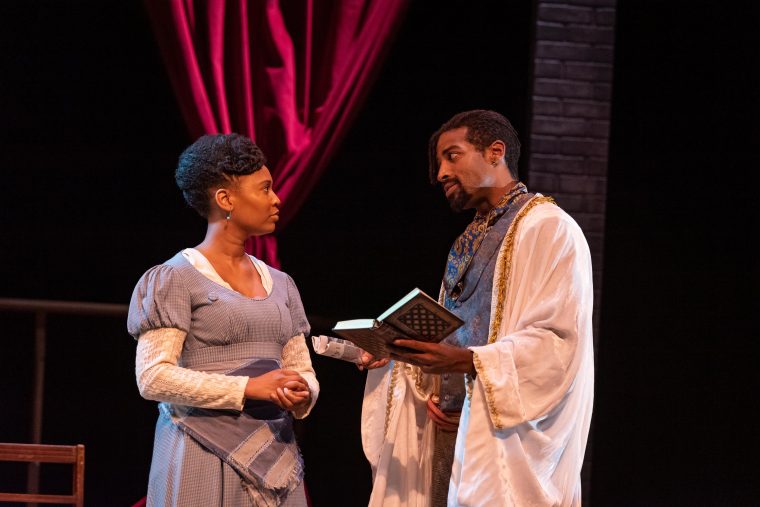Scene
A Must-See: The Black Rep is back with a spin on a Shakespeare original

James Hewett played by Cameron Jamarr Davis deep in conversation with Ann Johnson played by Coda Boyce (Courtesy of Micaela Griffin).
In the St. Louis Black Repertory Company’s production of Carlyle Brown’s play The African Company Presents Richard III, William Shakespeare lingers like one of his own ghosts. He stands as almost a representation of art itself and as such, this immortality brings out the best and worst in people as they strive for artistic perfection. Shakespeare’s work is received like gospel by the characters, in both the reverence and skepticism with which they view it. The story hinges on the titular African Company of New York, a real-life theatrical stable from 1821.
In the play the troupe’s founder, William Brown, guides his production of Richard III to unlikely success and into direct competition with another production at the venerated (and, naturally for 1821, all-white) Park Theater. Brown, played with brilliant reserve by Olajuwon Davis, seems fixated on Shakespeare. For him, the work stands as an artistic pinnacle, and as a man on a quest to reinforce the oft-challenged importance of Black art, there seems no better place to establish himself than at the top.
This is where the play’s conflict stems from: not the idea of an all-Black theater company, although that engenders more than a few eye rolls from the dismissive white characters. It’s the idea of a Black performance of Shakespeare that causes skepticism and even vitriol: the play’s white characters reason that the work’s lofty status renders it out of bounds for people who are “below” it.
The finished product is a powerful examination of the role of Black art in a white-dominated culture. The direction of Ron Himes and the set design of Jamie Bullins emphasize a minimalism that engulfs the play’s world, shadowing against the striving of the characters.
Some, like Brown and his lead actor Jimmy Hewlett, view Shakespeare as a vehicle for liberation and equality. Others, most notably reluctant performer Ann Johnson, see him as an example of what they should be seeking liberation from. Hewlett, played magnetically by Cameron Jamarr Davis, is constantly seeking to prove himself through his art.
Occasionally, the pointedly natural and drab design of the lighting and direction will fade to a dreamlike state, allowing the audience to become solely immersed in the work of the characters.
Davis’s palpable anger animates the role and feeds the idea that Shakespeare, for these characters, is the best of the best, the peak of a mountain they’ve been climbing their whole lives.
Coda Boyce, in my opinion, gives the best performance in the show as Ann Johnson, a woman torn between so many forces that it’s a miracle she’s still together. She finds herself in love with Jimmy but unable to explain why, despite his habit of seemingly ignoring her existence. She’s been recruited into the African Company’s performances but can’t square herself with her role, finding it morally repugnant. For her, the idea of Black artistry restraining itself to a white artist simply reinforces antiquated ideas about race-based hierarchy. Boyce is simply a must-see, stealing every scene with a miraculous blend of fragile but potent stoicism and live-wire discontentment.
I’d be remiss not to mention Papa Shakespeare, a carefree older man played by Wali Jamal Abdullah who seems to have adopted a role in the African Company more for fun than for any concrete artistic statement. Shakespeare provides most of the play’s delightful comic relief while also building meaningful bridges between the other characters.
The rest of the cast is uniformly excellent, turning the lofty themes and ideas of the play into compelling drama. They sell an intricately-designed world of artistic strife and struggle that rides on their passion and earnestness. The text is brilliantly interpreted by the crew as well as the cast: specifically, Himes’s direction flies and Andre Harrington’s costumes are outstanding. Every element coheres to create a convincing portrait of the different roles art plays in everyone’s lives.
All in all, The African Company Presents King Richard III is phenomenal, and I highly recommend making time to see it. The play runs through September 25th at Edison Theater, with tickets starting at $20.
For another review of the Black Rep, see:
Beauty and History in 80 Minutes: “Dontrell Who Kissed The Sea”
